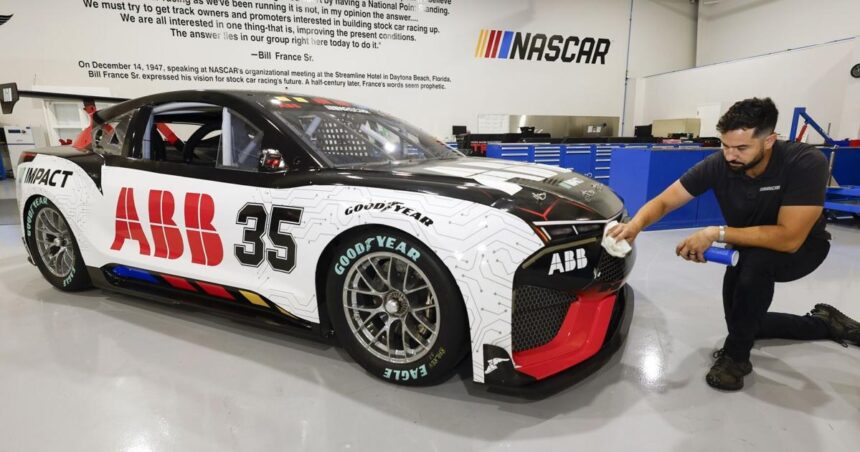CHICAGO — A key aspect of attending a NASCAR race is the thundering roar of the engines as the cars speed past at over 150 mph.
NASCAR showcased its first electric racecar in downtown Chicago, marking a significant departure from the traditional ear-deafening noise associated with racing events.
The collaboration between NASCAR, Chevrolet, Ford, Toyota, and ABB aimed to introduce a high-performance electric vehicle and assess the interest of fans in electric racing.
Riley Nelson, NASCAR’s head of sustainability, emphasized the goal of making electric vehicles and electrification in racing appealing and accessible to a broader audience.
The Associated Press had an exclusive look at the $1.5 million prototype, which has been test-driven by semi-retired NASCAR driver David Ragan. The car is set to hit the Chicago street course for some speedy laps on Sunday morning.
People are also reading…
Ragan praised the unique experience of driving the electric racecar, highlighting the absence of the typical engine noise and smell associated with gasoline-powered vehicles. He commended the quieter and cleaner drive of the electric car.
Unlike conventional sports cars, the new electric racecar is designed as a crossover utility vehicle, with a large rear wing for aerodynamic performance on the racetrack.
The electric racecar’s acceleration and braking capabilities surpass those of gas-powered cars, although it may take corners at a lower speed due to its weight. NASCAR aims to push the boundaries of electric vehicle technology through this initiative.
Eric Warren, GM’s global motorsports competition head, highlighted the potential of electric racing in engaging NASCAR fans and promoting energy efficiency. He emphasized the importance of using racing as a platform to educate fans about sustainable practices.
The move towards electric racing aligns with NASCAR’s broader sustainability plan, with ABB serving as the official electrification partner. The plan includes the installation of electric vehicle charging stations at NASCAR tracks across the U.S., promoting the use of renewable energy sources.
By embracing electric racing, NASCAR aims to reduce its environmental impact and pave the way for a cleaner future in motorsports. The new electric racecar signifies a shift towards sustainable practices and innovation in the racing industry.
NASCAR’s commitment to sustainability extends beyond electric racing, with plans to introduce sustainable fuel, recycle at all events, and transition to 100% renewable electricity by 2028. The racing organization aspires to achieve “net zero” emissions by 2035, emphasizing its role in driving positive change in the industry.
The introduction of electric racing vehicles represents a significant milestone for NASCAR and signals a new era of innovation and environmental awareness in the racing world.





